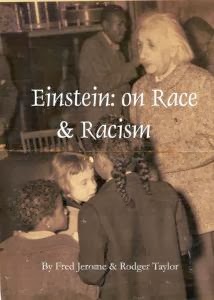 |
| Source: New York Public Library |
In this dramatic, surprise-filled story, unfolding against a backdrop of an era when America was sweat-drenched in fear and paranoia over national security, readers will discover a new dimension to Albert Einstein. The avalanche of Einstein images – genius, brilliant, absent-minded, kindly, bumbling and more – has all but buried Einstein's political dimension, and totally covered up his civil-rights activities which have remained virtually unknown to his tens of millions of fans and followers.
But in an age of increasing tribalization around the world, the fact that Einstein and Paul Robeson, two of the 20th Century's most famous and popular figures, were not only friends but co-chaired the American Crusade to End Lynching and shared a dozen other anti-racist activities, could serve as a role model for millions. Yet the story has remained untold – until now – as has Einstein's support for W. E. B. Du Bois, his friendship with Marian Anderson and his many ties with the African American people living in Princeton's own little ghetto, in and around Witherspoon Street.
Here, the authors interweave Einstein’s civil-rights letters, speeches and articles, brought together in this volume for the first time, with candid interviews with African American Princetonians who remember Einstein, and historical developments, many of which rocked the nation.
As the authors say in their preface, if racism in America depends for its survival at least partly on the smothering of anti-racist voices, then this book is intended to be part of a grand unsmothering.
Excerpts From the Preface:
AUTHORS' PREFACE TO EINSTEIN ON RACE AND RACISM
By Fred Jerome and Rodger Taylor
More than one hundred biographies and monographs of Einstein have been published, yet not one of them mentions the name Paul Robeson, let alone Einstein’s friendship with him, or the name W. E. B. Du Bois, let alone Einstein’s support for him. Nor does one find in any of these works any reference to the Civil Rights Congress whose campaigns Einstein actively supported. Finally, nowhere in all the ocean of published Einsteinia – anthologies, bibliographies, biographies, summaries, articles, videotapes, calendars, posters and postcards – will one find even an islet of information about Einstein’s visits and ties to the people in Princeton’s African American community around the street called Witherspoon.
Yet, despite Einstein’s clear intention to make his politics public – especially his anti-lynching and other antiracist activities – the history-molders have seemed embarrassed to do so. Or nervous.
Readers may judge for themselves how much of this oversight is due to forgetting and how much may be due to other motives (including, perhaps, disagreement with Einstein’s point of view). It is not so much the motive for the omission, but the consequence that concerns us. Americans and the millions of Einstein’s fans around the world are left unaware that Einstein was an outspoken, passionate, committed anti-racist. “It is certain – indeed painfully obvious – that racism has permeated US history both as idea and practice,” as the historian Herbert Aptheker states. “Nevertheless,” he adds, “It always has faced significant challenge.”
Racism in America depends for its survival in large part on the smothering of anti-racist voices, especially when those voices come from popular and widely respected individuals – like Albert Einstein. This book, then. aspires to be part of a grand un-smothering.
From "Ideas and Opinions," by Albert Einstein:
"It seems to be a universal fact that minorities--especially when the individuals composing them can be recognized by physical characteristics--are treated by the majorities among whom they live as an inferior order of beings. The tragedy of such a fate lies not merely in the unfair treatment to which these minorities are automatically subjected in social and economic matters, but also in the fact that under the suggestive influence of the majority most of the victims themselves succumb to the same prejudice and regard their kind as inferior beings. This second and greater part of the evil can be overcome by closer association and by deliberate education of the minority, whose spiritual liberation can thus be accomplished.
"The resolute efforts of the American Negroes in this direction deserve approval and assistance."
Mein Weltbild (my conception of the world), Amsterdam: Querido Verlog, 1934, pp 117-118.
Authors' website: Einstein on Race and Racism
Amazon.com: Einstein on Race and Racism
Comments